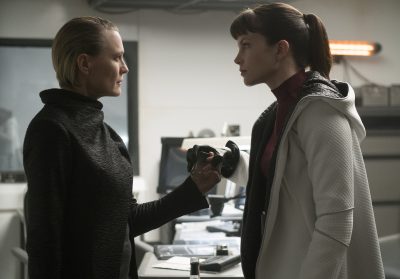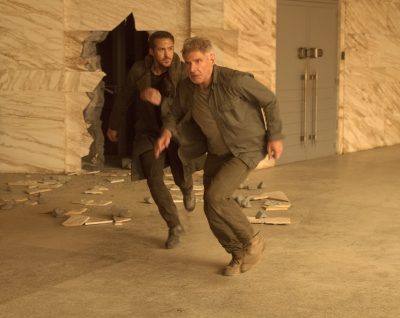
Blade Runner 2049 – Officer K (Ryan Gosling) – Photo courtesy of Warner Bros. Pictures.
Officer K – a blade runner working out of LAPD – finishes an assignment and sets off a chain reaction that could be world altering.
Blade Runner opens with Officer K (Ryan Gosling) locating a protein farmer named Sapper Morton (Dave Bautista). Things don’t go well and, after a fight he really shouldn’t have been able to win, K ‘retires’ Morton.
Noticing a flower (which should never have existed outdoors) near a dead tree, he has drone scan the site. It finds a box buried almost thirty feet down.

Blade Runner 2049 – Rick Deckard (Harrison Ford) – Photo courtesy of Warner Bros. Pictures.
When he returns to the precinct, we learn something unexpected about K – and shortly thereafter, we learn that his discovery at Morton’s farm could trigger a war.
The mystery box, it turns out, isn’t the only mystery here. Events transpire to create doubts and speculation in K’s mind.
At the same time, he’s being urged by his boss, Lt. Joshi (Robin Wright), to retire another, significant replicant.

Blade Runner – Lt. Joshi (Robin Wright) and Luv (Sylvia Hoeks) – Photo courtesy of Warner Bros. Pictures.
In his search for himself, he encounters several different people – the tech mogul Niander Wallace (Jared Leto), a tech genius who took over the bankrupt Tyrell corporation and used Tyrell’s replicant technology as a base to create a replicant that would obey a human and not try to harm one even at the cost of its own life; and Luv (Sylvia Hoeks), Wallace’s right-hand person/replicant and occasional hitperson (Hoeks holds the screen every time she appears); Dr. Ana Stelline (Carla Juri), a specialist who builds memory implants for replicants; and, eventually, Rick Deckard (Harrison Ford).
The script, by Hampton Fancher (Blade Runner) and Michael Green (Logan), is as deliberate and elegantly dark as its predecessor – with characters who could be slotted into a Philip Marlowe or Sam Spade film. Even K’s unusual girlfriend, Joi (Ana de Armas) is a 21st century take on the lead female in a pulp novel.

Blade Runner 2049 – Joi (Ana de Armas) and K (Ryan Gosling) – Photo courtesy of Warner Bros. Pictures.
Director Denis Villeneuve (Arrival, Sicario) captures the basic tone of the original while taking it further – there are more monolithic buildings, more rain, more smog, more lost souls.
While Blade Runner 2049 has its bursts of action – excellently deployed, too – it’s more concerned with mood, tone and character. It’s more concerned with life in 2049.
There are, of course, references that provide unexpected delights – K’s visit to Gaff (Edward James Olmos) in a seniors’ home yields an origami sheep; there’s a reflection of a Han Solo line, and a few other moments that pay homage to Blade Runner and Star Wars while adding glimpses into characters.

Blade Runner 2049 – K (Ryan Gosling) and Rick Deckard (Harrison Ford) – Photo courtesy of Warner Bros. Pictures.
Blade Runner 2049 is not the action flick that the TV spots make it out to be – it’s considerably more thoughtful and provocative than that (though the violence and action, when they come) can be very powerful.
With Blade Runner 2049, Denis Villeneuve solidifies his reputation for making thoughtful, powerful films.
Final Grade: A